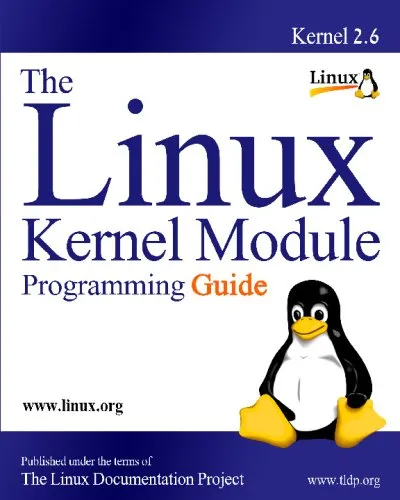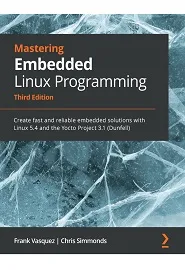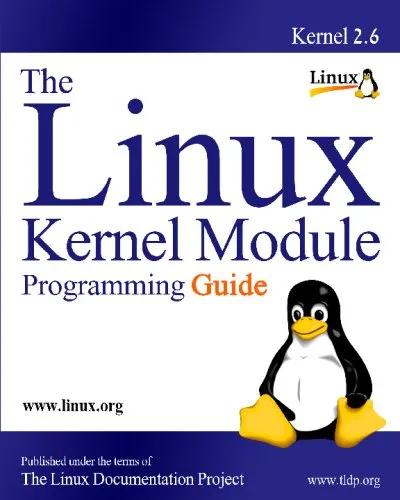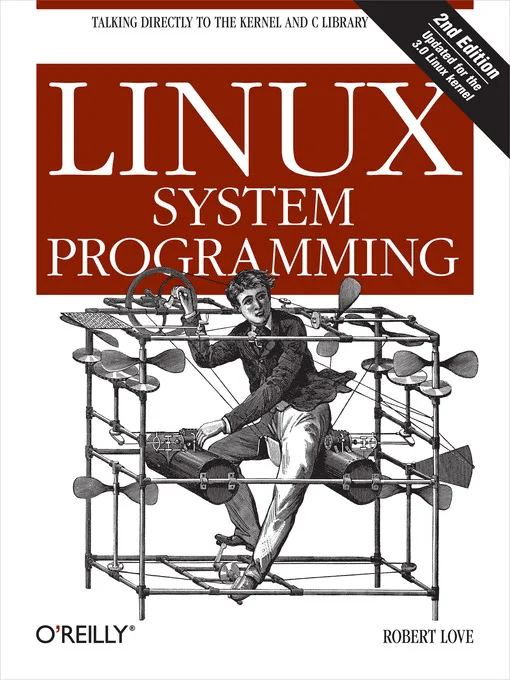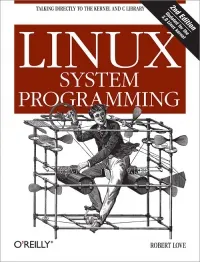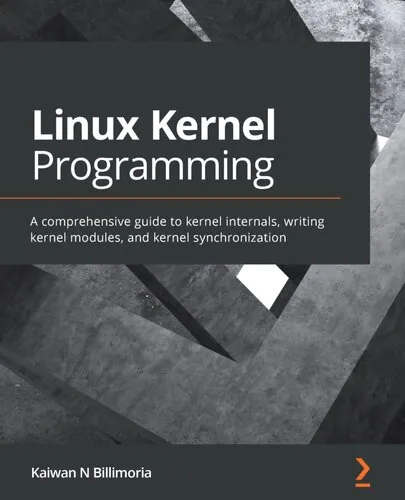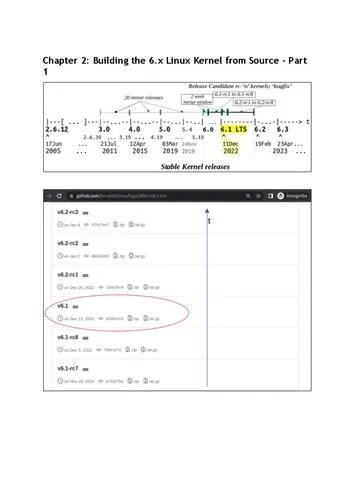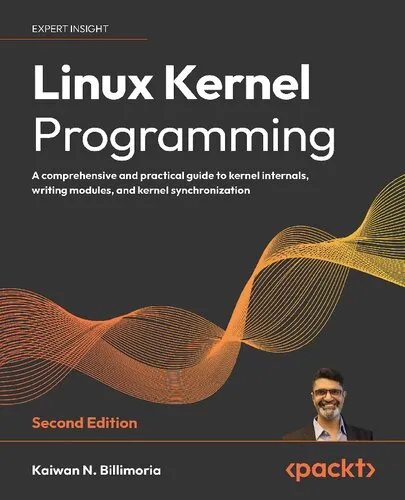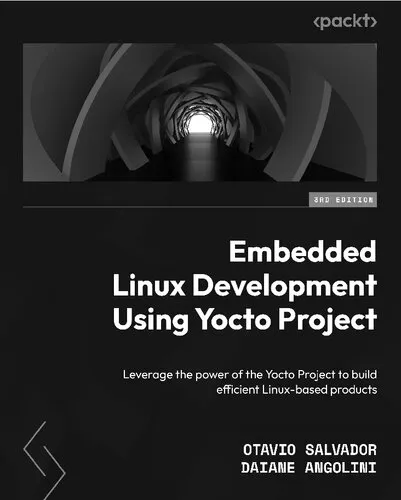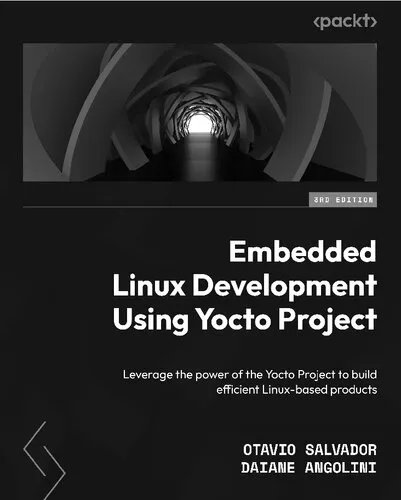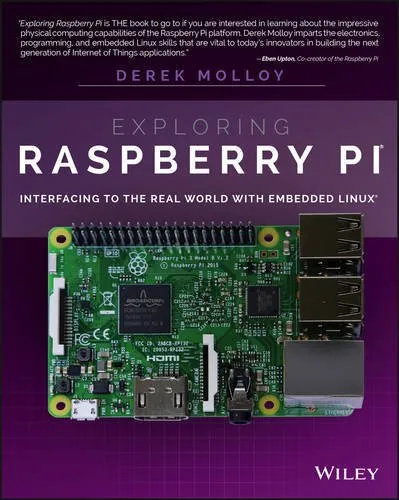Linux Kernel Module Programming Guide
4.0
بر اساس نظر کاربران

شما میتونید سوالاتتون در باره کتاب رو از هوش مصنوعیش بعد از ورود بپرسید
هر دانلود یا پرسش از هوش مصنوعی 2 امتیاز لازم دارد، برای بدست آوردن امتیاز رایگان، به صفحه ی راهنمای امتیازات سر بزنید و یک سری کار ارزشمند انجام بدینکتاب های مرتبط:
مقدمهای بر کتاب 'Linux Kernel Module Programming Guide'
کتاب 'Linux Kernel Module Programming Guide' راهنمایی جامع برای علاقهمندان به برنامهنویسی ماژولهای Kernel در سیستم عامل Linux است. این کتاب تجربهای عملی برای توسعهدهندگان فراهم میآورد تا به صورت مؤثر و کارآمد با Kernel کار کنند.
خلاصه جامع کتاب
این راهنمای جامع به کاوش در زمینه برنامهنویسی ماژولهای Kernel، از اصول اولیه تا مفاهیم پیچیدهتر، میپردازد. در این کتاب، مفاهیمی چون ایجاد ماژولهای ساده، مدیریت حافظه، و تعامل با سختافزار بررسی میشود. با پوشش دادن موضوعاتی نظیر نحوه بارگذاری و تخلیه ماژولها در Kernel، این کتاب به خواننده اجازه میدهد تا به درک عمیقتری از عملکرد داخلی سیستم عامل Linux دست پیدا کند.
مطالب کلیدی
- درک ساختار و معماری Kernel
- نوشتن و اشکالزدایی ماژولهای ساده
- مدیریت منابع و استفاده بهینه از حافظه
- ارتباط و تعامل با درایورهای سختافزاری
- امنیت و مواجهه با خطاها
نقلقولهای معروف از کتاب
«هرگز از اهمیت Kernel در عملکرد سیستم غافل نباشید، چون این قلب تپندهی دنیای اطلاعات شماست.»
«برنامهنویسی Kernel به شما قدرتی میدهد که در هیچ جای دیگری نمیتوانید پیدا کنید، قدرتی که به شما اجازه میدهد که حتی در عمیقترین لایههای سیستم خود تغییری ایجاد نمایید.»
چرا این کتاب اهمیت دارد؟
کتاب 'Linux Kernel Module Programming Guide' به توسعهدهندگان و علاقهمندان به رایانه این امکان را میدهد تا از نزدیک با قلب سیستمهای Linux آشنا شوند. در روزگاری که تکنولوژی و مباحث مرتبط با سیستمهای عامل روز به روز پیچیدهتر میشود، داشتن دانش عمیقی مانند آنچه این کتاب فراهم میکند، اهمیت بیشتری پیدا میکند. به دلیل نقش حساس و بنیادین Kernel در مدیریت منابع سیستم و اجرای وظایف اساسی، آگاهی دقیق از چگونگی عملکرد آن میتواند تفاوتی چشمگیر در مهارتهای فنی یک توسعهدهنده ایجاد کند.
Introduction
Welcome to the "Linux Kernel Module Programming Guide," a comprehensive resource designed to empower developers with the skills required to write Linux kernel modules. Whether you are a seasoned developer or just starting your journey into kernel programming, this guide offers invaluable insights into the inner workings of the Linux operating system, focusing specifically on module development.
Detailed Summary of the Book
The "Linux Kernel Module Programming Guide" delves into the core principles and practices necessary for developing modules that seamlessly integrate with the Linux kernel. The book starts with an introduction to the kernel's architecture, explaining its features, components, and the significance of kernel modules. It provides step-by-step instructions on setting up a suitable development environment and compiling a kernel with support for module insertion.
As you progress, the book takes you through the intricacies of writing your first kernel module, offering robust examples and practical exercises to solidify your understanding. You will explore essential topics such as managing memory within the kernel, handling concurrency, and interfacing with hardware. Furthermore, it covers debugging techniques, performance optimization strategies, and tools to analyze kernel module behavior.
Through illustrative examples and detailed explanations, the book ensures you gain a deep understanding of how to extend the functionality of the Linux kernel safely and efficiently.
Key Takeaways
- In-depth understanding of Linux kernel architecture and module mechanics.
- Practical skills in setting up and configuring a Linux kernel development environment.
- Proficiency in writing, compiling, and inserting kernel modules.
- Insights into effective debugging and performance optimization of kernel modules.
- Ability to interface hardware efficiently through kernel modules.
Famous Quotes from the Book
"The Linux kernel is more than just a colossal collection of code - it's a vibrant and dynamic ecosystem that evolves with each release."
"Writing a kernel module is like constructing a finely-tuned orchestra, where every piece must work in harmony to produce the desired outcome."
Why This Book Matters
The significance of the "Linux Kernel Module Programming Guide" cannot be overstated. Linux is one of the most widely used operating systems today, powering everything from humble embedded devices to the world's most powerful supercomputers. Understanding how to develop kernel modules enables developers to customize and optimize the Linux OS to meet specific needs and maximize performance.
This book is essential for anyone looking to gain a competitive edge in software development, system administration, or IT infrastructure management, as it provides insights crucial for contributing to or leveraging open-source technologies effectively. Moreover, the knowledge gained from this guide can be instrumental in advancing your career in a tech-driven world economy.
By immersing yourself in this guide, you can become part of a vibrant community of Linux enthusiasts and professionals dedicated to innovation and excellence in the field of software development.
دانلود رایگان مستقیم
شما میتونید سوالاتتون در باره کتاب رو از هوش مصنوعیش بعد از ورود بپرسید
دسترسی به کتابها از طریق پلتفرمهای قانونی و کتابخانههای عمومی نه تنها از حقوق نویسندگان و ناشران حمایت میکند، بلکه به پایداری فرهنگ کتابخوانی نیز کمک میرساند. پیش از دانلود، لحظهای به بررسی این گزینهها فکر کنید.
این کتاب رو در پلتفرم های دیگه ببینید
WorldCat به شما کمک میکنه تا کتاب ها رو در کتابخانه های سراسر دنیا پیدا کنید
امتیازها، نظرات تخصصی و صحبت ها درباره کتاب را در Goodreads ببینید
کتابهای کمیاب یا دست دوم را در AbeBooks پیدا کنید و بخرید
1506
بازدید4.0
امتیاز0
نظر98%
رضایتنظرات:
4.0
بر اساس 0 نظر کاربران
Questions & Answers
Ask questions about this book or help others by answering
No questions yet. Be the first to ask!
